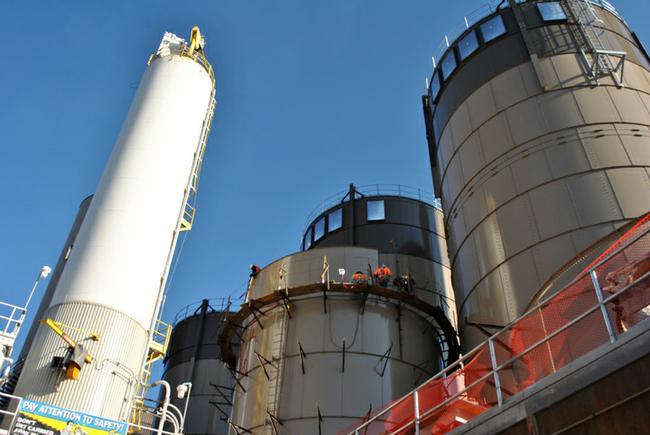By fall 2012, more than a quarter of the coal in the MU Power Plant will be replaced by a more sustainable fuel: biomass.
MU Power Plant superintendent Gregg Coffin said the plant will use MU’s first 100 percent biomass boiler, provided by Babcock & Wilcox Power Generation Group Inc.
The existing boilers in the power plant have been burning coal traditionally. Since 2005, a portion of the fuel for the four boilers has been replaced by a more environmentally friendly fuel blend, burning woody biomass and waste agricultural products with coal.
“Coal has sulfur, but biomass has zero sulfur,” Coffin said. “Using biomass is going to reduce emissions significantly, including greenhouse gas emissions.”
It is estimated that a minimum of 100,000 tons of biomass will be used in the new boiler annually, utilizing a technology called Combined Heat and Power. The CHP facility can produce thermal energy and electricity for the campus simultaneously, resulting in an overall efficiency of nearly twice that of a conventional power plant, Coffin said.
He said MU’s power plants have been using CHP since the 1890s.
The biomass for the plant is going to be provided by Foster Brothers Wood Products, Inc., [a wood products company in Auxvasse](http://www.fosterbros.com/), according to Coffin. This biomass supply contract was signed in September with deliveries expected to start next summer.
MU Extension forestry professor Hank Stelzer was on the procurement team to help draft MU’s contract with Foster Brothers.
“Foster Brothers is the largest handler of woody biomass in the state and they are very visible,” Stelzer said. “They promised to meet the sustainability requirements by signing the contract.”
Peter Becker from the Eastern Ozarks Forestry Council has named this contract as a national model.
Stelzer said by signing the contract, MU is making an effort to improve the health of Missouri’s forests.
“We have a forestry department embedded with the power plant,” Stelzer said. “No other university institution has a forestry department involved to the level that we are involved with the power plant.”
Stelzer said the only other university that was looking at doing a project of this size was the University of Wisconsin. Due to Wisconsin’s budget crisis, the project has been canceled.
The biomass boiler project will cost $75 million. The cost of the biomass delivered to the plant will average about $38 to $40 per ton, Coffin said. A notable portion, 87 percent, of MU’s project funding is from bonds approved by the UM System Board of Curators.
In Missouri, there is no regulation to protect forests within the state from being abused. All guidelines are merely at a voluntary level. There is no licensing of foresters and forest products companies do not have to be licensed.
The contract aims to improve the health of Missouri’s forests by requiring landowners to have a forest management plan in place and follow it. It would also require the logger to follow harvesting guidelines set forth in the Missouri Woody Biomass Harvesting Best Management Practices Manual before accepting the biomass into the power plant, Stelzer said.
It also stipulates no clear-cutting of woods by the supplier unless there is a natural disaster that destroys the forest or it is called for in the forest management plan.
According to the contract, only 10 percent of the biomass comes from forest-derived residues consisting of top branches, trees removed due to thinning operations and diseased or undesirable trees.
Stelzer said the greatest challenge with any biomass harvesting is doing it economically.
“It is very costly to remove biomass,” Stelzer said. “It’s extremely low value. It takes the same kind of equipment but greater care.”
The contract with Foster Brothers was signed for six years with two-year extensions possible, Stelzer said.
In addition to the biomass project, the MU Power Plant is also planning to use solar panel and wind turbines to generate power in the future, Coffin said.








